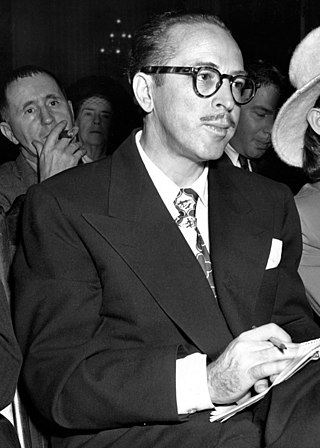
James Dalton Trumbo was an American screenwriter who scripted many award-winning films, including Roman Holiday (1953), Exodus, Spartacus, and Thirty Seconds Over Tokyo (1944). One of the Hollywood Ten, he refused to testify before the House Un-American Activities Committee (HUAC) in 1947 during the committee's investigation of alleged Communist influences in the motion picture industry.

Nicholas Meyer is an American screenwriter, director and author known for his best-selling novel The Seven-Per-Cent Solution, and for directing the films Time After Time, two of the Star Trek feature films, the 1983 television film The Day After, and the 1999 HBO original film Vendetta.

Larry Hovis was an American singer and actor best known for the 1960s television sitcom Hogan's Heroes.
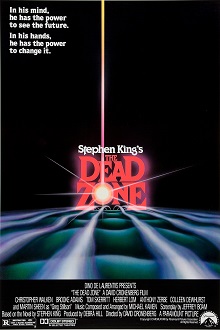
The Dead Zone is a 1983 American science-fiction thriller film directed by David Cronenberg. The screenplay, by Jeffrey Boam, is based on the 1979 novel of the same name by Stephen King. The film stars Christopher Walken, Brooke Adams, Tom Skerritt, Herbert Lom, Martin Sheen, Anthony Zerbe, and Colleen Dewhurst. Walken plays a schoolteacher, Johnny Smith, who awakens from a coma to find he has psychic powers. The film received positive reviews. The novel also inspired a television series of the same name in the early 2000s, starring Anthony Michael Hall, the pilot episode of which borrowed some ideas and changes used in the 1983 film.
Mitch Davis is an American film director, writer, and producer noted for his 2001 film, The Other Side of Heaven, about the trials and adventures of a missionary of the Church of Jesus Christ of Latter-day Saints, John H. Groberg. His movies range from intense dramas to lighthearted, family-friendly comedies. He has written seven films, directed five, and produced three. He is from Escondido, California. He attended Brigham Young University (BYU) and the University of Southern California.
John Lee Mahin was an American screenwriter and producer of films who was active in Hollywood from the 1930s to the 1960s. He was known as the favorite writer of Clark Gable and Victor Fleming. In the words of one profile, he had "a flair for rousing adventure material, and at the same time he wrote some of the raciest and most sophisticated sexual comedies of that period."
Neal Purvis and Robert Wade are British screenwriters who co-wrote the seven James Bond films from 1999's The World Is Not Enough to 2021's No Time to Die, as well as other works.

John August is an American screenwriter, director, producer, and novelist. He is known for writing the films Go (1999), Charlie's Angels (2000), Charlie's Angels: Full Throttle (2003), Big Fish (2003), Charlie and the Chocolate Factory (2005), Corpse Bride (2005), Frankenweenie (2012), the Disney live-action adaptation of Aladdin (2019), the novels Arlo Finch in the Valley of Fire (2018), Arlo Finch in the Lake of the Moon (2019) and Arlo Finch in the Kingdom of Shadows (2020).
Lionel Chetwynd is a British-American screenwriter, director and producer.
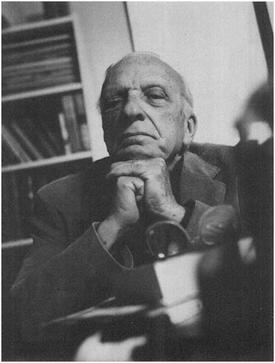
Philip Yordan was an American screenwriter of the 1940s, 1950s and 1960s who produced several films. He acted as a front for blacklisted writers although his use of surrogate screenwriters predates the McCarthy era. His actual contributions to the scripts he is credited with writing is controversial and he was known to some as a credit-grabber. Born to Polish immigrants, he earned degrees from both University of Illinois and Chicago-Kent College of Law.

Philip Ives Dunne was an American screenwriter, film director and producer, who worked prolifically from 1932 until 1965. He spent the majority of his career at 20th Century Fox. He crafted well regarded romantic and historical dramas, usually adapted from another medium. Dunne was a leading Screen Writers Guild organizer and was politically active during the "Hollywood Blacklist" episode of the 1940s–1950s. He is best known for the films How Green Was My Valley (1941), The Ghost and Mrs. Muir (1947), The Robe (1953) and The Agony and the Ecstasy (1965).
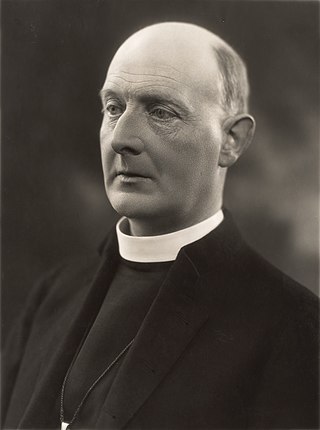
Cyril Forster Garbett was an Anglican bishop and author. He was successively Bishop of Southwark (1919–32), Bishop of Winchester (1932–42) and Archbishop of York (1942–55).

Gerald Robert "Jerry" Molen is an American film producer. He has worked closely with Steven Spielberg, having produced five of his films, and won an Academy Award for co-producing Schindler's List. In 2019, Movicorp announced Molen will be producing Sweet By and By, a multi-racial southern gothic romantic thriller; and in 2021, Molen began initial preparations of the mini-series. Molen is now semi-retired and spends his time alternating between Montana and Las Vegas, Nevada.
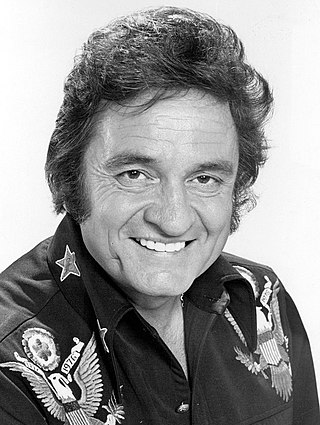
John R. Cash was an American country singer-songwriter. Most of Cash's music contained themes of sorrow, moral tribulation, and redemption, especially in the later stages of his career. He was known for his deep, calm bass-baritone voice, the distinctive sound of his Tennessee Three backing band characterized by train-like chugging guitar rhythms, a rebelliousness coupled with an increasingly somber and humble demeanor, free prison concerts, and a trademark all-black stage wardrobe, which earned him the nickname the "Man in Black".
Rand Ravich is a film and television director, writer, and producer. He wrote and directed the 1999 science fiction thriller The Astronaut's Wife, starring Johnny Depp and Charlize Theron. He was a producer on the film Confessions of a Dangerous Mind, and also wrote the screenplays for the Candyman sequel Candyman: Farewell to the Flesh and the 1997 movie The Maker. Ravich is the creator of the NBC television drama series Life. He was also the show's executive producer and one of the writers. He created the 2014 NBC thriller drama Crisis.
Orma W. Wallengren, also known as Claire Whitaker and Claire Whitaker Peterson, was the author of the screenplay of Latter-day Saint films Johnny Lingo and Man's Search for Happiness. Under the name of Clair Whitaker she was a writer for several TV shows including The Waltons and Falcon Crest.

Alan Wenkus is an American screenwriter, film producer and a former VP of programming for Premiere Radio Networks. Wenkus has been nominated for several awards for his work in television and film including a Writers Guild of America Award, the NAACP Image Award and an Academy Award for Best Original Screenplay. He's best known for co-writing and Executive Producing Straight Outta Compton.
Riwia Brown is a New Zealand playwright. She is the screenwriter of the popular and award-winning New Zealand movie Once Were Warriors (1994). The Once Were Warriors screenplay, adapted from the book of the same name by Alan Duff, gained Brown the Best Screenplay award at the 1994 New Zealand Film and TV Awards. Brown has written for theatre, television and films.
Jaideep Sahni is an Indian screenwriter, songwriter and creative producer, who wrote the screenplays for films like Chak De! India, Khosla Ka Ghosla, Company, Bunty Aur Babli, Rocket Singh: Salesman of the Year and Shuddh Desi Romance.

Johnny Lingo is a 1969 short film directed by Wetzel O. Whitaker. The film and later remake are based on a short story by Patricia McGerr, originally published in a 1965 issue of Woman's Day. The 24-minute film was produced by Brigham Young University, but does not specifically mention The Church of Jesus Christ of Latter-day Saints outside of the credits.











